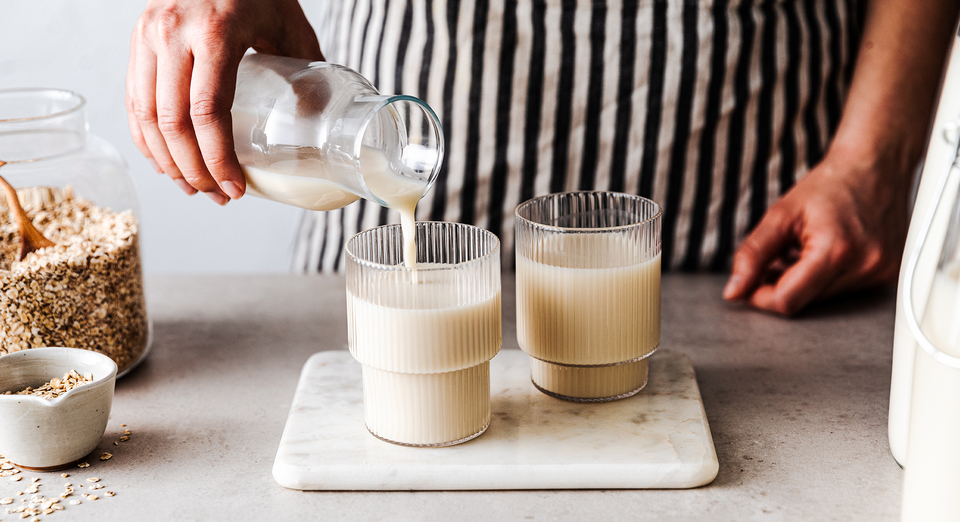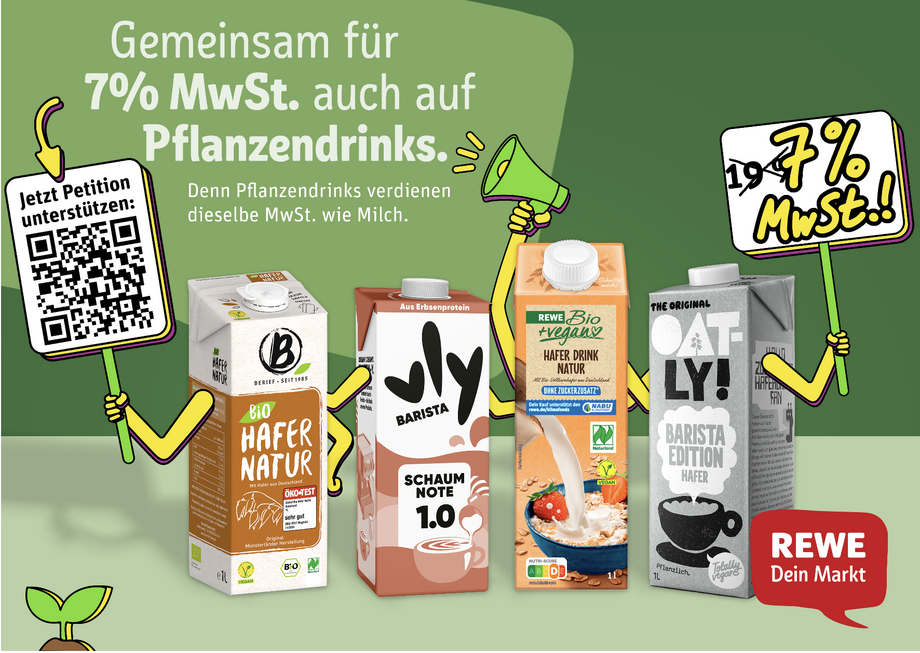
REWE and the manufacturers vly, Berief and Oatly are jointly calling on the German Bundestag to apply the reduced VAT rate of 7 per cent to plant-based drinks made from oats, peas, soya, etc. The alliance has launched a petition to this end on the change org platform. The alliance has launched a corresponding petition on the change.org platform.
The petition calls on the Bundestag to reduce the VAT rate from the current 19 per cent to 7 per cent. The petition can be signed here:Petition - Together for 7% VAT on plant-based drinks too - Germany - Change.org. The alliance is hoping for broad public support by sharing the link and signing the petition. #lessisfair
REWE, vly, Berief and Oatly believe that the current higher tax rate of 19 per cent discriminates against certain consumer groups and contradicts climate, health and nutrition policy goals1. Equal tax treatment with other basic foodstuffs is therefore objectively necessary and socially just. The partners are primarily concerned with creating a level playing field. The tax reduction should be passed on to consumers by the companies.

„We are seeing increasing demand for plant-based protein sources in our markets. This also applies to plant-based drinks, which are a good supplement or alternative for many consumers. Equal tax treatment with cow's milk would promote real freedom of choice. This is why we initiated the petition together with industry partners, because it contributes to diverse protein sources, food sovereignty and fair competition.“Emilie Bourgoin, REWE Group Director Public Affairs
 Copyright: REWE
1. Equal treatment of comparable products
Copyright: REWE
1. Equal treatment of comparable products
The categorisation of animal milk as a "staple food" and plant-based drinks as "beverages" is not plausible, as the latter are an important option for people who do not consume animal milk for various reasons. This includes, for example, intolerances, allergies or certain dietary preferences. Equalising the tax treatment of plant-based drinks and animal milk makes it easier for consumers to make choices according to their personal needs. The sharp rise in demand for plant-based drinks in recent years shows that these products are accepted by the population as a wholesome alternative and are seen as a staple food2. The higher VAT penalises people who consume plant-based drinks, affects their freedom of choice and makes their access to a staple food relevant to them more expensive.
2. Environmental Sustainability
Adjusting the tax rate would also be a lever for transforming our food system towards greater Sustainability. Compared to the production of animal milk, the production of plant-based drinks requires less land and water and leaves a smaller carbon footprint3. This means that plant-based options can make an important contribution to climate protection and to reducing the environmental impact of our diet.
3. Economic advantages
A reduction in VAT also makes sense from an economic perspective. Although the adjustment would reduce tax revenues, it would also reduce the consequential climate costs. A study by the Institute for Policy Evaluation puts the reduction in tax revenue in one year at around 40 million euros. This is offset by the reduction in future climate impact costs due to lower CO2 emissions totalling around 62.4 million euros4.
4. Balanced nutrition and health benefits
Fortified plant drinks are a nutritious choice and are listed in official dietary recommendations around the world, for example in Finland5 and the UK6. Plant drinks support a balanced diet. According to the German Nutrition Society (DGE), a plant-based diet for adults can be health-promoting - taking into account certain aspects such as supplementation with vitamin B12, a balanced and well-planned food selection and a needs-covering intake of potentially critical nutrients. The DGE also mentions other health benefits such as low saturated fat, no cholesterol and some phytochemicals and fibre7.
5. European comparison
In a European comparison, hardly any other EU country penalises plant-based drinks as much as Germany when it comes to VAT. France, the Czech Republic and Portugal, for example, apply the same tax rate to cow's milk and plant-based drinks. Equal tax treatment of animal dairy products and plant-based drinks is not only objectively necessary, but also a step towards a fairer, healthier and more sustainable food policy.
REWE, vly, Berief and Oatly are therefore calling on people to sign the petition and appeal to the members of the German Bundestag to take the necessary steps to equalise VAT on plant-based drinks! #lessisfair
1 (EAT Lancet Commission, 2019, is.gd/UHyT2w)
2 (BMEL, 2024, https://is.gd/3qjUjR)
3 (Joseph Poore, Thomas Nemecek, 2018, https://is.gd/UBvcsC)
4 (Institute for Policy Evaluation, 2023, https://is.gd/F84ALR)
5 (National Institute for Health & Welfare (THL), 2024, https://is.gd/utGw70)
6 (Public Health England, 2016, https://is.gd/xlEorm)
7 (DGE, 2024, is.gd/u3gUmd)
